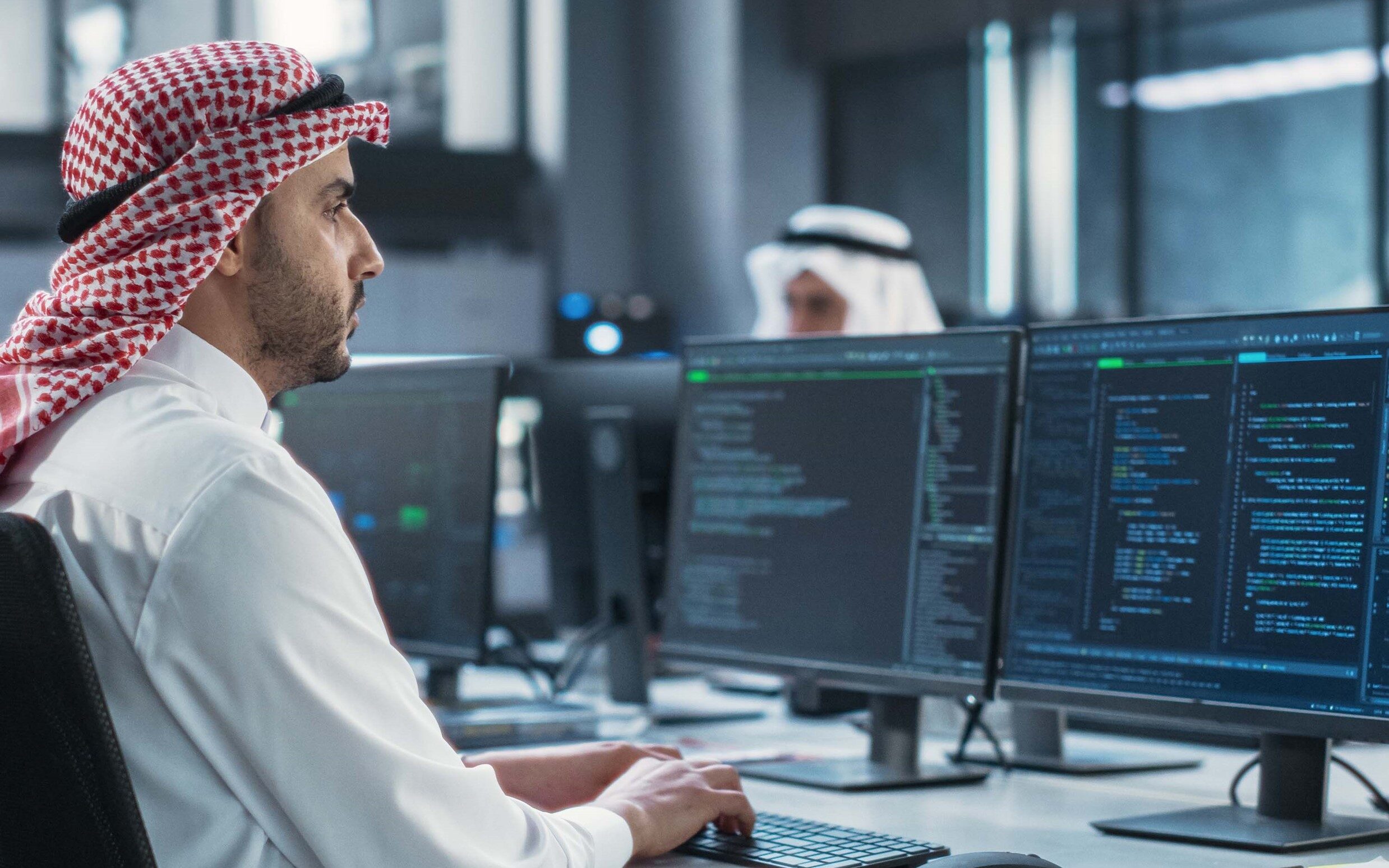Digital transformation across the Arab World is driving GDP growth, finding solutions for incumbent problems, and creating new investment and job opportunities. “The Arab region has experienced remarkable growth and transformation across all sectors with the support of digital transformation,” the Information Technology Union (ITU), a UN agency, said in September. “Governments in the region have launched ambitious … plans [to create] an inclusive and sustainable digital economy for their citizens.”
The next step is allowing artificial intelligence (AI) and machines that “learn and adapt without following explicit instructions” to recommend actions and make decisions. A PricewaterhouseCoopers report estimates AI technology could add $15.7 trillion to the global economy by 2030. Oxford Business Group said in April that 2% of that ($320 billion) could go to the MENA region. To realize those gains, AI’s contribution to the region’s GDP should “range between 20% and 34% [from] 2018 to 2030.”
A McKinsey report in May said GCC countries, especially the UAE and Saudi Arabia, are ahead in adopting AI. The report cited their unrivaled commitment to the technology, having introduced dedicated strategies, government agencies, national celebrations and awards, and laws.
That could prove to be an opportunity for Egypt, which announced its AI strategy in 2021. Cooperating with the GCC could accelerate the development of homegrown AI tools via knowledge transfer. It also could significantly reduce barriers when using such AI apps across the region by standardizing use guidelines.
GCC and AI
GCC-based companies and government agencies are embracing AI implementation. According to McKinsey’s report, 88% of surveyed retailers and consumer packaged goods producers use AI. Meanwhile, 61% of those offering professional services said they benefit from it. In energy and materials, it was 60% of respondents; financial services, 55%; and capital projects and infrastructure, 50%.
The report said AI pioneers in the region adopted the technology “because they operate in an internationally competitive market and are keen to capture the opportunities AI offers to raise efficiency in production, distribution and maintenance.”
“At first glance, the [statistics are] relatively encouraging,” said Vinay Chandran, a partner at McKinsey. A closer look shows that may not be the case because “few companies are using more advanced machine learning analytics and AI models. Companies [in the GCC] typically use linear, regression-based analytics techniques, [rather than] machine learning models to optimize end-to- end processes.”
The other problem is implementation tends to be in departments with limited links to other parts of the business. McKinsey’s report said marketing and sales departments saw the highest adoption rates. That means little benefit from AI is seen in manufacturing, R&D, and other core functions.

Challenging implementation
On the ground, that limited rollout is because “capturing that potential is never … easy,” said Chandran. “It requires a high level of organizational change to embed AI technology and new ways of working.”
The McKinsey report said the first challenge is “linking AI strategy to the enterprise strategy.” That is evident in low “senior leadership buy-in,” which could secure funding and support business-led use. Even if top executives are on board, company AI advocates may also need to “overcome resistance” from rank-and-file employees. That would require investing in making “analytics user-friendly, establishing collaboration between IT and business teams, [and] embarking on a change management program.”
McKinsey said another challenge for GCC countries is attracting and building “AI talent.” That includes finding the right caliber of people, organizing internal training, and cooperating with international AI service providers and academia. Collecting and storing significant sufficient data for AI software to forecast patterns and trends correctly also can be challenging. It requires investment in infrastructure and operational changes. McKinsey said companies that want to capitalize on AI need to “manage data as a product to deliver short and long-term value [and] build a flexible technological architecture.”
To entice more use, Niklas Berglind, an Emblasoft Group AB board member, wrote in a July 2022 McKinsey article, “Governments … play an active and critical role in capturing the many benefits of implementing AI technology.” Their efforts include increasing awareness and supporting and incentivizing existing and new companies to use AI technology by creating a “vibrant AI ecosystem.”
UAE efforts
The UAE was the first Arab country to take concrete steps to use AI to build its economy. In 2017, it created the region’s only AI ministry. Omar Bin Sultan Al Olama, minister of state for artificial intelligence, digital economy and remote work applications, said the purpose is “enhancing the government performance levels by investing in the latest technologies and tools of artificial intelligence and applying them in various sectors.”
In 2018, the ministry created the UAE Council for Artificial Intelligence and Blockchain to oversee AI integration in government and education. The council “proposes policies to create an AI-friendly ecosystem, encourage research in the sector and promote collaboration between the public and private sectors, including international institutions, to accelerate the adoption of AI.”
Three years later, the ministry announced its Artificial Intelligence Strategy 2031. The official document said it “aims to enhance the UAE’s reputation in this field by attracting AI companies and coders from around the world.” Al Olama told the media the plan is to use AI to increase the UAE’s ICT sector contribution from 11.7% of non-oil GDP in 2021 to 20% by 2031.
In March 2022, Dubai International Finance Center (DIFC) and the UAE Artificial Intelligence Office, which operates under the AI Ministry, introduced licenses for local and foreign companies that work in AI and coding. “Companies holding the license will be able to work within a stimulating environment at the DIFC Innovation Hub … representing over 60% of all GCC fintechs,” said the office. Foreign employees in licensed companies are eligible for the “UAE Golden Visa,” which offers “long-term residence … within three months” of applying.
Two months later, Al Olama published the Generative AI Guide. According to the official blurb, it “explores the challenges and opportunities of various digital techniques and recommends best approaches for effectively managing them … across various fields.” The document also emphasizes “data privacy” when using such apps.
The guide also highlights “100 use-cases and applications of Generative AI for new business owners, students, fresh graduates, job seekers [and] new employees.” It also showcases how AI technology can “facilitate the development of healthcare, education and transport services [by] automating customer service queries, improving response time and efficiency.”
The government also celebrates UAE Codes Day on Oct. 29. Mohammed bin Rashid Al Maktoum, vice president and prime minister of the UAE and ruler of Dubai, said on the state’s portal the day is “to honor the contributions of coders and programmers.”
The UAE also presents the annual UAE AI & Robotics Award for Good to “raise awareness [of] positive opportunities [and] encourage innovative research and application solutions … to meet challenges in … health, education and social services.” It is open to “individuals, teams, universities and companies.”
There also is the National Program for Artificial Intelligence (BRAIN), a “comprehensive and consolidated compilation of [AI and robotic] resources” and software. It also curates the “various initiatives, collaborations, partnerships and breakthroughs in … AI, and the impact of all these on humankind.”
Saudi Arabia efforts
The Saudi government first discussed developing AI-enabled tools and solutions in its 2030 Vision of the Kingdom of Saudi Arabia, launched in 2016. A year later, it invited Sophia, an AI-powered humanoid developed by Hanson Robotics, to talk at the annual Future Investment Initiative forum. At the event, the Saudi government granted the humanoid “citizenship.”
It was only in 2018 that the state announced the first steps to build its AI ecosystem by establishing the Saudi Data and Artificial Intelligence Authority (SDAIA). It is the “central authority responsible for organizing, developing and overseeing all AI- related matters.” In parallel, the government announced plans for 5G networks to realize the full potential of AI-powered apps.
In 2020, the SDAIA launched the country’s National Strategy for Data and AI to “unify efforts and launch national initiatives in data and artificial intelligence and make optimal use of them.” At the same time, the government said it would allocate $20 billion to develop AI through 2030. Also that year, the National Center for Artificial Intelligence (NCAI), a branch of SDAIA, signed an MoU with Huawei. At the launch event, Majid Altuwaijri, CEO of NCAI, said the agreement would see Huawei train Saudi AI engineers and students to localize solutions to meet the country’s 2030 vision. Sharaf Al-Ghamdi, SDAIA president, stressed, “This initiative will play an important role in supporting the Kingdom in achieving its 2030 vision goals, of which 70% are directly impacted by … data and AI.”
The SDAIA, in 2020, also signed agreements with IBM and Alibaba to support the development of AI solutions in health, energy and other sectors, said Al-Ghamdi. Two years later, the Saudi government an agreement with the ITU to collaborate on AI policies and initiatives to accelerate the UN’s 2015 Sustainable Development Goals.
In July 2023, Saudi Arabia ranked first in the government category of the Global AI Index, published by Tortoise Intelligence, a think tank specializing in AI. The country had perfect scores in all of the category’s sections: strategy, resolve, development, talent, infrastructure, operating environment, and commercial. Saudi’s overall rank was 31st out of 60 countries.
Also this year, the SDAIA announced a draft law to allow existing intellectual property law to cover “innovative” solutions developed by AI-powered software.
The Saudi government also supports other nations that want to develop homegrown AI-based solutions. Al-Ghamdi told the Middle East Political and Economic Institute, a think tank, his agency wants to ensure “no one is left behind.”
To realize that vision, the SDAIA signed an agreement with the World Bank in 2020. At the announcement event, Makhtar Diop, World Bank vice president of Infrastructure, said, “The technology … comes with risks which, if left unattended, can threaten to inflate the widening AI divide between — and within — developing countries, increasing social inequality and leaving millions, if not billions, even further behind. This initiative aims to help governments harness AI technologies while adopting the appropriate safeguards for ensuring privacy and protection, as well as inclusivity and unbiased algorithms.”
Egypt to benefit?
In May 2021, Egypt announced its own AI strategy to cover government applications and operations, development projects, training and infrastructure. It also focuses on developing frameworks for AI governance to prevent misuse and ensure transparent metrics. Other priorities are data creation and collection, growing the ecosystem by attracting organizations working in AI to operate locally and improving digital infrastructure.
According to the Information and Decision Support Center (IDSC), the target is for AI to contribute to 7.7% of Egypt’s GDP by 2030. The IDSC’s 2022 Vision on Road to Development paper said, “That requires … tangible progress in digital transformation and collecting useful data on which the AI applications depend.”
Working with GCC countries could prove beneficial in realizing that goal. According to 2021 research from Brookings Institution, “Cooperation among governments … can maximize the advantage of scale and exploit comparative advantages for mutual benefit.” That includes maximizing AI R&D, ensuring responsible and ethical use to build trust, finding common regulatory ground for cross-border data exchanges and developing more effective AI-based solutions.







